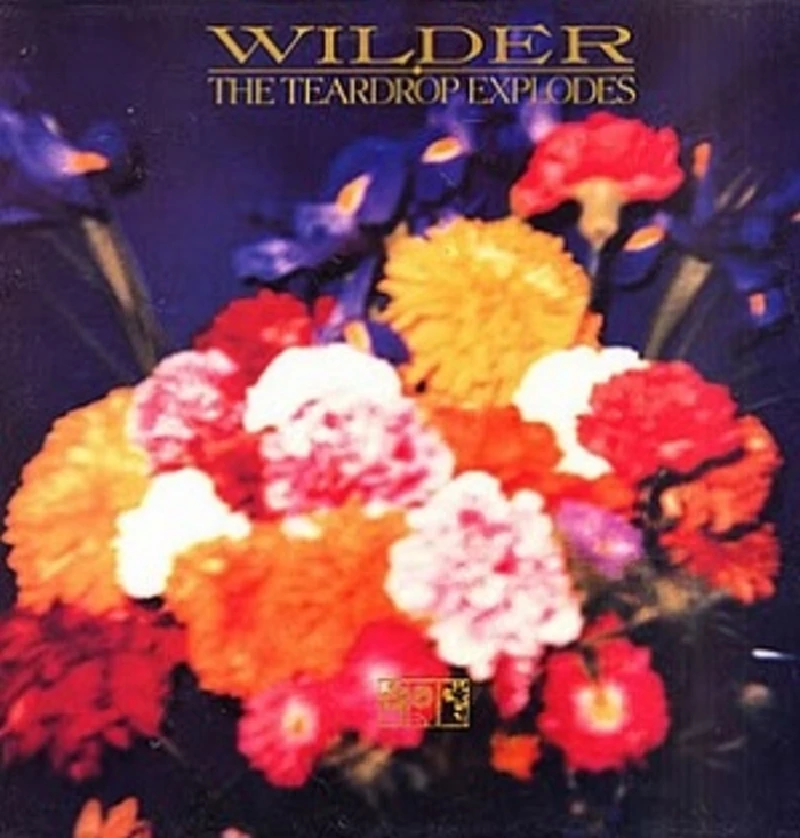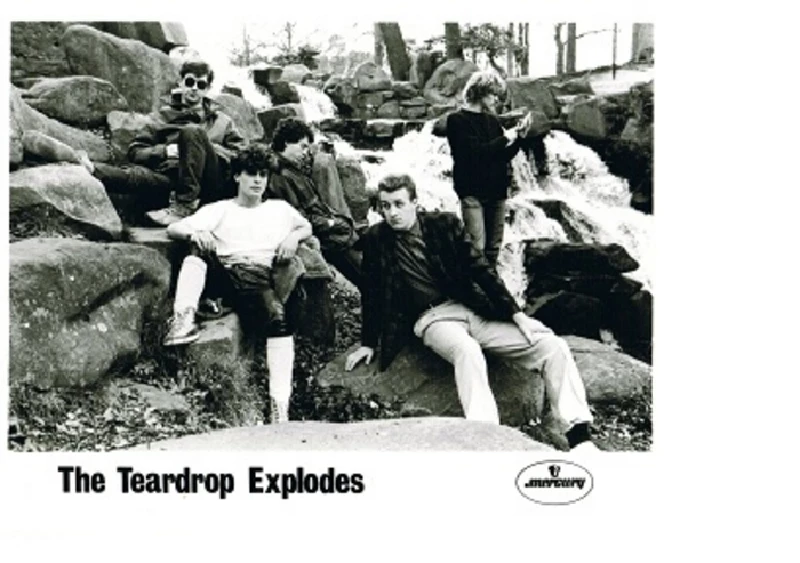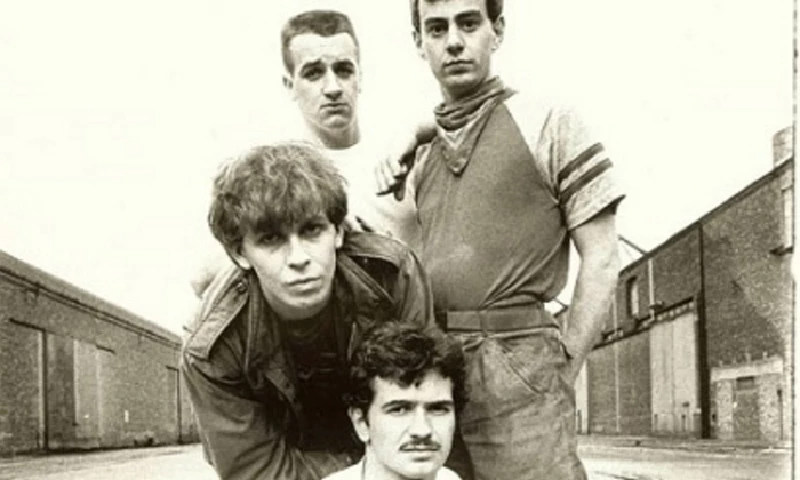Teardrop Explodes - Wilder
by Jon Rogers
published: 25 / 5 / 2013

Label:
Select Label
Format: N/A
intro
In our 'Re:View' section, in which we look back at albums from the past, Jon Rogers reflects upon the chaotic making of Liverpool post-punks the Teardrop Explodes' 1981 second and final album 'Wilder', which is about to be released in a new double CD edition
The Julian Cope-fronted Teardrop Explodes may have emerged out of Liverpool's post-punk scene, but by the time of their second album 'Wilder' in November 1981 the band were far removed from the likes of the Gang of Four, Public Image Ltd or Magazine. In fact, the band did not really have that much in common with that genre. The nucleus of the group, which focused around Cope and keyboardist David Balfe, had an interest in experimentation. They also, however, had an ear for a catchy, cute pop hook as well as an enduring love of US 60’s psychedelic, garage rock as profiled on 'Nuggets' and the LSD-laced exploration of Syd Barrett-era Pink Floyd. Even the band's name - taken from a Marvel comic - had more in common with the psychedelic 60s rather than the cold, grey aesthetic of post-punk in the late 70s. "I think we're very poppy. To me pop is something you hum. What I'm trying to do is strike a balance between triteness and greatness," Cope told the 'Melody Maker' in November 1980. Bill Drummond, who managed Echo and the Bunnymen and was co-founder of Liverpool's indie label Zoo, who released The Teardrop Explodes first singles, put it more succinctly. "All that post-punk vanguard stuff, we'd just think that was completely stupid," he told Simon Reynolds for 'Rip It Up and Start Again'. "You could never have a Gang of Four, say, coming out of Liverpool." For Cope, the band's songs were "just cries of joy... whatever form the songs come in, there's always some kind of rejoicing". For Cope, the band's raison d'être was "nice". "The whole idea of the Teardrops to me is nice, nice melodies and lyrics that, while always sung hopefully, have dark secrets in them". It had been that pop sensibility that had propelled the band up the charts - number six with the single 'Reward' and to 18 with 'Treason (It's Just a Story)'. The band hit the big time in early 1981 - helped no doubt by a memorable performance of 'Reward' on BBC1's 'Top of the Pops' which Cope later confessed he'd done whilst high on LSD. And bingo, the band were bona fide pop stars, teeny-bop idols. But the band's taste for being teen pop heroes was over in a flash. The band never really happily embraced that sensibility and internal fighting within the group was pulling it apart. On one hand there was part of the band that saw itself aligning with what was becoming termed the 'New Pop', which was being used to describe the likes of The Human League and Orange Juice as a reaction to what they saw as the grey, monochrome aesthetic of overly serious groups like Scritti Politti and the Pop Group. But Cope was repelled by what he saw as the passionless, emotionless attitude of the post-punk underground and yet was also repulsed by the vapid, shallowness of anodyne pop music. He complained to the 'NME' at the time: "It's getting to be like the early seventies again where you had the hippies into all their weird music." Aside from the internal divisions, Cope was on his own self-destructive path to do his best to sabotage his own commercial success. Inspired by his heroes like Syd Barrett and Roky Erikson, he embarked on his own journey to become what he later called "the white male fuck up" in what he perceived to be that erratic notion of genius-as-madman. Looking back at that period he said in 1991: "The idea was that the accumulation of all my heroes would be one hell of a god to be." He gobbled hallucinogens and his behaviour became more and more erratic. At one point he even chopped his blonde locks off and insisted people call him Kevin Stapleton. Basically, the sort of behaviour the teeny-bop idols would not like. Just to make the situation worse, Cope's first marriage was disintegrating. He'd married Kathy Cherry whilst still quite young, but admitted in his memoirs 'Head On' that in reality they were just good friends. That had, however, not stopped his feelings of guilt after he'd started an affair with an American Dorian Beslity - who would eventually become his second wife. It was perhaps not the ideal background to be recording your second album, especially with the record label having high expectations of you. But the new-look group piled into Air Studios on the top floor at 214 Oxford Street in London in the summer of 1981. Cope admits in his memoirs that the sessions sometimes "became total bloody hell" and that the record was not even made by a group. "Clive Langer would play guitar, [David] Balfe made all the weird synth noises and I played most of the piano and organ [...] Balfe and I were taking a lot of speed and our judgement become severely impaired." Songs changed radically once they started to put them down on tape. 'Seven Views of Jerusalem', inspired by a vision Cope had whilst on acid of poet William Blake painting scenes from his 'Jerusalem' lyric, started life as "a kind of acoustic Tim Buckley country ballad" before Balfe called it "shit" and virtually re-wrote the song. Similarly, one of Cope's favourite songs on the album, 'The Great Dominions', which would eventually close the record, had been previously aired on tour but done simply with the use of the piano. Once in the studio, Cope wanted a radical re-working of the song. Balfe created a synthesized loop on his Prophet 5. He sellotaped the D notes down and "just played the buttons", while Cope added an organ part and Gary Dwyer's drums were recorded in Studio 1 with just one microphone hanging from the ceiling. There were, what Cope called "major freak outs" during the recording of 'Wilder', with the singer even going as far as returning to Liverpool for a weekend and spent the time just moaning and bitching. With all the band problems going on, there were inevitable delays in recording that sent costs spiralling. Not to mention Cope tripping for days on acid that slowly brought recording to a standstill. Their first album 'Kilimanjaro', which had come out in October 1980, had cost a total of £20,000, and 'Wilder' was only half-finished and they had already spent twice that amount. Despite the band's success so far they were still all rather poor, living off £35 a week, not even enough to pay Cope's Columbia Hotel phone bill to the States to talk to Dorian let alone things like food. Most of the time producer Clive Langer, rich from his string of Madness hits, had to take them out to eat in the evenings. Their record label Phonogram were also piling on the pressure as they wanted a follow-up to the success of 'Reward', and were demanding both the delivery of a hit single within two weeks and also the album to be completed in time to hit the Christmas market. Even agreement on what song should be the first single could not be reached. The record label wanted 'Colours Fly Away', while Cope preferred 'Bent Out of Shape' - the title being lifted from one of Beslity's favourite phrases. Cope, who was simply out of shape from too much drug consumption, ultimately conceded and let Phonogram have their way. The Air Studios sessions were not an entirely awful experience, and Cope fondly remembers Paul and Linda McCartney who were recording in the same studio with Wings. The two groups started hanging out together, even with the McCartneys giving Cope presents on his 24th birthday. When the album finally saw the light of day, the initial signs were good and there were high hopes, certainly amongst the record label, for the record. 'Passionate Friend' - a song Cope eventually admitted was about his affair with his Crucial Three partner Ian McCulloch's sister, Julie - had been released as a single and reached a respectable 25th in the charts. It was slightly lower than the previous one 'Treason' which had hit the heights of 18, but was still a respectable showing. The album though was a much darker affair than the previous 'Kilimanjaro', and far more experimental than the likes of the more radio-friendly 'Reward'. Looking back with hindsight, the album nowadays seems to detail break-ups of one sort or another - the break up of Cope's first marriage, the break-up of his mental stability (fuelled by his own wayward drug consumption) and the break-up of the band itself. Songs such as 'Bent Out of Shape', 'Falling Down Around Me' and 'The Culture Bunker' detailed Cope's own mental state, and the state of the band. 'Passionate Friend' and 'And the Fighting Takes Over' detailed the disintegration of his marriage and subsequent affairs. It was all subject matter that was far from being suited to the usual Top 40 fodder dished out on 'Top of the Pops'. The album stalled at 29 in the chart, five places lower than their debut. Listening to the album now it does seem very much a product of its day, with the arrangements far too reliant on horns and brass instruments and it sounding generally, vastly over-produced. And Cope's voice is really quite awful. Never the greatest singer at the best of times for being 'in-tune', on 'Wilder' he's distinctly flat and his voice is thin and weedy. There are though some great songs there. 'Passionate Friend' should really have been a huge hit, while 'The Great Dominions' and 'The Culture Bunker' showed off the band's prowess as musicians that had something more to them than just a catchy pop melody. In fact though with this reissue once the listener has refreshed their memory of the album, the first disc can really be forgotten about as it is the bonus disc of 'extras' where the real gems lie. The second disc compiles the more obscure B-sides from the singles, including the splendid 'Christ Versus Warhol' and 'East of the Equator' as well as a live version of 'Sleeping Gas' from their Club Zoo residency. And it's topped off with a number of BBC radio sessions from the John Peel and Richard Skinner shows that include a take on John Cale's 'I'm Not the Loving Kind' and a storming version of 'Screaming Secrets'. With the album done and dusted the band decamped to the Pyramid Club in Liverpool for their Club Zoo residency which would prove to be the beginning of the end for the band. It was a six-week journey into excess. Cope was showing signs of mental instability, and drew a black 'X' on his stomach with magic marker pen in an attempt to ward off evil spirits. He would spend most of his time on the top floor of the club which became the band's "inner sanctum", and even then he would avoid the rest of the band in his "inner, inner sanctum" cut off from almost everyone else where he would just, effectively take whatever drug he was given. The band's performances were highly erratic with Cope often simply "baying like a hound" during songs or simply wading into the audience and singing whilst hidden from view from the rest of the group. Sometimes he would stop songs if some audience member had the temerity to talk whilst they were playing. And Cope was not adverse to even giving his clothes away from the stage. 'Colours Fly Away', the follow up to the single 'Passionate Friend', could only reach 54 in the charts. The band's situation only grew worse on an ill-fated American tour which turned into a drug-fuelled disaster, and the band disintegrated before their very eyes. There is a case to be made that perhaps the Teardrop Explodes never managed to meet expectations or potential. To some extent they were their own worst enemies, too busy consuming drugs and in-fighting to concentrate on their artistic interests, but, while 'Kilimanjaro' might have had the hooks and melodies, 'Wilder' was probably a more accurate representation of the band and their interests.
Track Listing:-
Picture Gallery:-


most viewed articles
current edition
Carl Ewens - David Bowie 1964 to 1982 On Track: Every Album, Every SongColin Blunstone - Thalia Hall, Chicago, 16/7/2025
Visor Fest - Valencia, Spain, 26/9/2025...27/9/2025
Bathers - Photoscapes 2
Bathers - Photoscapes 1
Billie Eilish - O2 Arena, London, 10/7/2025
Editorial - July 2025
Cathode Ray - Interview
John McKay - Interview
Cleo Laine - 1927-2025
previous editions
Heavenly - P.U.N.K. Girl EPTrudie Myerscough-Harris - Interview
Beautiful South - Ten Songs That Made Me Love...
Pixies - Ten Songs That Made Me Love...
Boomtown Rats - Ten Songs That Made Me Love....
Fall - Hex Enduction Hour
Sam Brown - Interview Part 2
Doris Brendel - Interview
Jimmy Nail - Interview
Blues and Gospel Train - Manchester, 7th May 1964
most viewed reviews
current edition
Amy Macdonald - Is This What You've Been Waiting For?Sick Man of Europe - The Sick Man of Europe
Alice Cooper - The Revenge of Alice Cooper
Phew, Erika Kobayashi,, Dieter Moebius - Radium Girls
Lucy Spraggan - Other Sides of the Moon
Blueboy - 2
Cynthia Erivo - I Forgive You
Davey Woodward - Mumbo in the Jumbo
Lapsley - I'm a Hurricane, I'm a Woman In Love
Philip Jeays - Victoria
Pennyblackmusic Regular Contributors
Adrian Janes
Amanda J. Window
Andrew Twambley
Anthony Dhanendran
Benjamin Howarth
Cila Warncke
Daniel Cressey
Darren Aston
Dastardly
Dave Goodwin
Denzil Watson
Dominic B. Simpson
Eoghan Lyng
Fiona Hutchings
Harry Sherriff
Helen Tipping
Jamie Rowland
John Clarkson
Julie Cruickshank
Kimberly Bright
Lisa Torem
Maarten Schiethart